Stroke Program
August 12, 2022
Piggott Man Remembers “Everything” About Stroke, Including Caregivers’ Kindness

Freddie Tate, 85, of Piggott, worked around helicopters during his time in the U.S. Air Force, but it wasn’t until March 5, 2021, when he suffered a stroke, that he rode in one for the first time. “I spent four years in the Air Force and we had all kinds of helicopters, but I’d never…
June 3, 2022
Survivor Throws Strike Against Stroke, Says Family History “Number-One Thing”

Ray Robinson III normally doesn’t hesitate. When he stepped up to the mound at Dickey-Stephens Park in North Little Rock on May 19 for UAMS Strike Out Stroke night, Robinson immediately went into a pitcher’s windup and fired a ceremonial first-pitch strike across the plate as the crowd cheered. But in the early morning of…
May 21, 2021
Monticello Man Grateful for More Family Time after Stroke Recovery
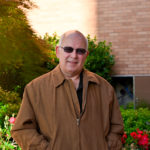
Bill Whiting, 67, of Monticello doesn’t remember a lot about what happened to him on Aug. 9, 2020. But he does know he called his wife. “He was mumbling,” Mary Whiting said. “I couldn’t understand what he was saying. I told him I’m on my way home.” She arrived within 10 minutes to find their…
March 9, 2021
UAMS-Led Digital Health Stroke Program Helps Improve Arkansas’ Stroke Deaths Ranking
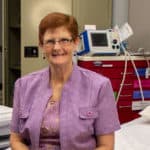
LITTLE ROCK — Arkansas recently fell from seventh place to 13th place in the nation in the number of stroke deaths per capita, an achievement health officials credit in part to a statewide digital health program of stroke education and treatment led by the University of Arkansas for Medical Sciences (UAMS). In 2011, Arkansas was…
August 28, 2020
Trauma, Stroke Networks Unite to Teach COVID-19 Best Practices, Share Information
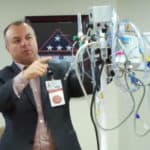
As the COVID-19 global pandemic threatened Arkansas in March, many physicians and nurses in rural hospitals across the state had more questions than answers about the new disease. UAMS went to work to answer them. The service is dubbed COVID-19 ED2ED All Sites Calls. More than 1,100 of the state’s health care professionals have taken…
August 11, 2020
Timely Treatment Saves 27-Year-Old from Stroke
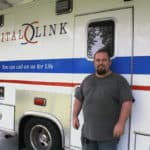
John Jansky was an unlikely candidate for a stroke. He does not smoke, have high blood pressure or any other contributing medical conditions. Jansky was also an unlikely stroke survivor because he lives in rural Pineville, Ark. – several miles from the nearest hospital. One Monday evening in December, Janksy got up from dinner with…
October 9, 2019
Digital Health Stroke Program Reaches Patient Care Milestone

Applause greeted Renee Joiner when she announced a long sought after achievement for Arkansas’ digital health stroke network — getting more than 50% of stroke patients from hospital arrival to treatment in 60 minutes or less. Along with many other speakers, Joiner, director of the UAMS Institute for Digital Health & Innovation Stroke Program, addressed…
May 3, 2019
FCC Commissioner Impressed by UAMS Digital Health Initiatives
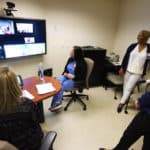
UAMS’ pioneering work in bringing health care to those who need it through digital health applications has drawn the attention of a top federal official who traveled from Washington D.C. to UAMS recently to see for herself. Jessica Rosenworcel, a commissioner on the Federal Communications Commission, visited April 29 with UAMS Chancellor Cam Patterson, M.D.,…
March 7, 2019
UAMS-Led Stroke Program Helps Lower Arkansas to Seventh in Stroke Deaths among All States

Arkansas recently fell from sixth to seventh place in the nation in the number of stroke deaths per capita, a huge improvement that health officials credit in part to a statewide telemedicine program of stroke education and treatment led by the University of Arkansas for Medical Sciences (UAMS). Only four years ago, Arkansas still was…
February 21, 2019
UAMS Establishes Institute for Digital Health & Innovation; Curtis Lowery, M.D., Named Director

The University of Arkansas for Medical Sciences (UAMS) has established the Institute for Digital Health & Innovation, and named Curtis Lowery, M.D., as its director.
Next page